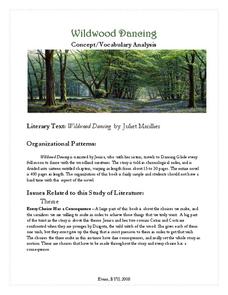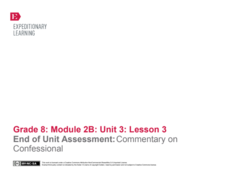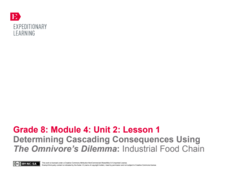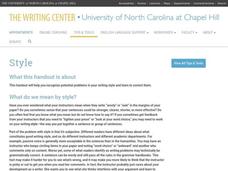Curated OER
Reciprocal Reading
The strategies associated with Reciprocal Reading are outlined in this language arts presentation. Pupils discover what it means to be the questioner, the summarizer, the predictor, and the clarifier. All four strategies lead to...
Indiana Department of Education
Indiana K-12 Educators’ Resource Toolkit
Imagine a tool that magically engages readers in the classroom. A handbook for Indiana educators doesn't guarantee success, but it does offer a variety of strategies for teachers to try. The handbook opens with research-based theory...
Curated OER
The Last Lecture: Exit Slip
Here's an exit slip activity that asks readers of The Last Lecture to identify three lessons from "Part III: Adventures and Lessons Learned" that resonated for them.
Curated OER
Self-Monitoring Strategies and Vocabulary Games
Middle and high schoolers identify how to discover a word's meaning by exploring context clues and any pictures, diagrams, photographs, and charts that might be included. They continue this process with other examples and locate one on...
Curated OER
QAR: Question Answer Relationships with an example from Canyons by Gary Paulsen
As you're reading Gary Paulsen's tale of self discovery and adventure, Canyons, bring this questioning strategy into your classroom. The QAR questioning strategy is meant to encourage a deeper analysis of the text, as some questions are...
Curated OER
Pairing Picture Books with Edith Hamilton's Mythology
As a before reading strategy, class members select a tale from mythology, examine several picture book versions of the myth, and fill out part of a Venn diagram with observations about the hero in particular and the myth in...
Curated OER
Jump-Start the Reading of Authentic Latin
Are your advanced learners reading authentic Latin this year? Whether you're teaching Caesar, Cicero or Virgil, use some of these strategies to map out your unit. What do you focus on? Consider taking small passages and making that the...
Curated OER
Fears and Phobias
Take the fear out of reading with this series of three lessons from HotWire Magazine about fears and phobias. Each lesson contains pre-reading and post-reading activities aimed at improving learners' reading comprehension skills with the...
ReadWriteThink
Word Recognition Strategies Using Nursery Rhymes
As a class, scholars read the poems, Humpty Dumpty, Peter, Peter, Pumpkin Eater, and Jack and Jill, in order to identify words with the same ending sound. Using their rhyming skills, learners brainstorm additional words...
Curated OER
Further Improvements of Writing Skills
Improve writing skills by finding a personal writing style, using descriptive language effectively, and using precise language. Middle schoolers discuss individual style in writing and formal and informal language. They utilize figures...
Curated OER
Creating Civic Awareness Through Artistic and Literary Forms
Interpret current events using editorial cartoons and other print media. Middle schoolers explore the meanings of literary and artistic terms such as satire, irony, and caricature. They visit internet sites to develop an understanding of...
K12 Reader
Adapting to Survive
Life science and language arts come together in a passage about animal adaptation. After kids learn about how organisms adapt to conditions in their environments, they complete five reading comprehension questions based on context clues...
Novelinks
Wildwood Dancing: Concept/Vocabulary Analysis
Considering including Juliet Marillier's young adult novel, Wildwood Dancing as part of your language arts curriculum? Check out an overview that examines some of the themes and issues presented by the novel.
K12 Reader
Using Prior Knowledge
Sometimes it's hard to relate to a new text. Teach kids to use their prior knowledge when reading something new with a comprehension exercise. A short passage tells them how to think of their brains like filing systems, and provides five...
EngageNY
Grade 10 ELA Module 1: Unit 3, Lesson 3
Few studies have captured the complex relationships between mothers and daughters, such as Amy Tan's The Joy Luck Club. Tenth graders read "Rules of the Game," which describes Waverly's youth in chess tournaments, and compare how she...
EngageNY
Mid-Unit Assessment: Analyzing an Informational Text about a Refugee Experience
Refugee & Immigrant Transitions is an organization that helps newcomers adjust to life in the United States through education and community leadership opportunities. As part of a mid-unit assessment, pupils independently read a...
EngageNY
End of Unit Assessment: Commentary on Confessional
What does commentary have to do with narrative? Before scholars explain the narrative choices in their Character Confessionals, they review provided commentary to explain the score they received on previous assessments. They review...
EngageNY
Studying Conflicting Interpretations: Perspectives on Plessy v. Ferguson: Part 2
The Plessy v. Ferguson case was influential in establishing segregation in the United States. Scholars continue reading the court's decision in the case, seeking to understand the key reasons the court came to its decision. Pupils also...
EngageNY
Determining Cascading Consequences Using The Omnivore’s Dilemma: Industrial Food Chain
Which of Michael Pollan's four food chains from his book The Omnivore's Dilemma would best feed everyone in the United States? Using a thought-provoking resource, scholars learn how to create a Cascading Consequences chart to answer the...
EngageNY
Writing a Position Speech: Which Food Chain Would Be Best?
Eeny, meany, miny, moe. It's time to choose a side. Scholars learn about taking a position by watching a video of a speech about local organic food. Next, pupils use graphic organizers to plan their speeches about which food chain is...
EngageNY
Building Background Knowledge: The Dinka and Nuer Tribes
Building on a previous lesson plan, readers continue using context clues to learn new vocabulary. Additionally, they continue working on their Gathering Evidence graphic organizers, making connections between an informational text and A...
EngageNY
Introducing the Performance Task Prompt and Beginning a Visual Representation
What exactly is a visual representation? Scholars use a think-pair-share to answer questions and record their information on anchor charts. Next, they use what they've learned to create visual representations of their position papers on...
Curated OER
Dyspraxia Presentation
Not really a resource for use in the classroom - this file is a PowerPoint presentation which gives information about Dyspraxia. It is a very interesting presentation because it shares many signs to look for in a person who may be...
University of North Carolina
Style
Just like you choose your clothes to ensure they fit the occasion, you should choose your words deliberately while writing. Style, the main topic of one handout in a series on writing skills, involves choosing words carefully and paying...

























